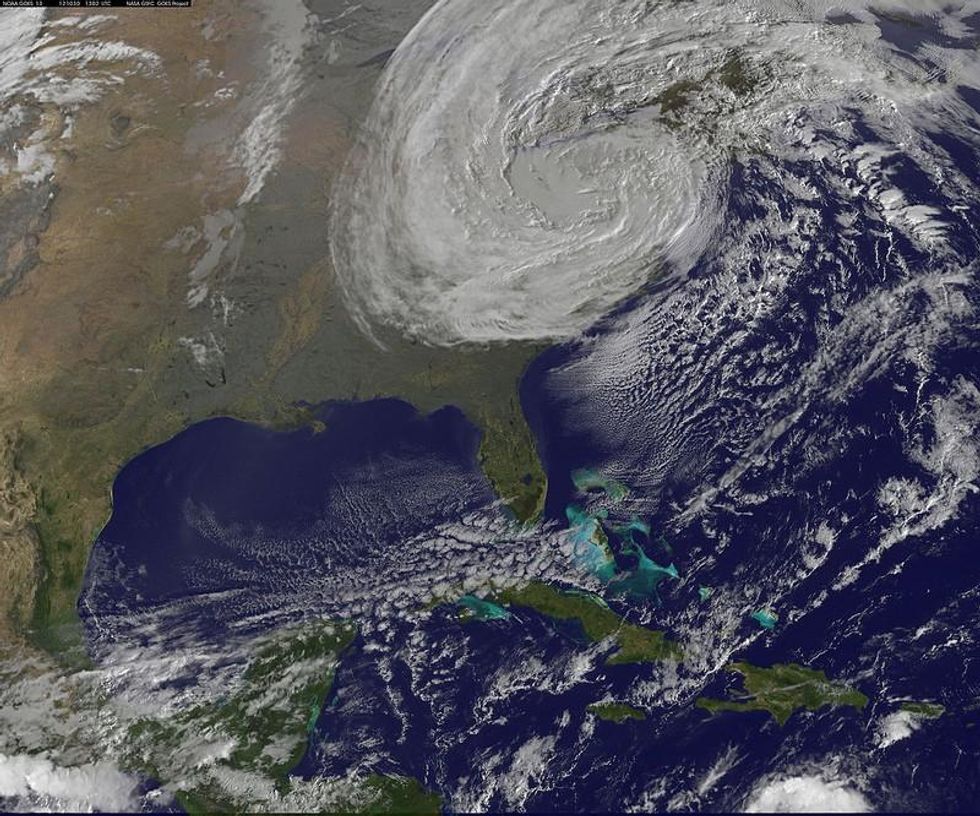Lately it seems like no one wants to talk about global warming. The issue has received so little attention from our political candidates during this election cycle that you'd think the problem had evaporated. That is until this week when Hurricane Sandy hit, flattening coastal neighborhoods, leaving millions of Americans without power and forcing dozens of others to face the worst loss of all as their loved ones were swept away.
The storm was unlike anything we've seen in a generation. It was also a sobering reminder of what's in store for us if we don't get serious about fighting climate change. We'll face more frequent and intense hurricanes, along with drought, wildfire and flooding. Globally, we'll see a spike in food and water shortages, famine, disease, and conflicts over shrinking resources. And poor communities will be hit first and hit hardest.
It's understandable that climate change has been the last thing on many of our minds. Americans have so much to worry about these days. Too many people are struggling to make ends meet. People are working longer and harder than ever, with less to show for it. When you're worried about what's for dinner and how to pay the rent, it's tough to get worked up about something that seems far-off and distant like global warming.
But for many Americans, it's a problem that's become impossible to forget. They don't have the luxury of ignoring rising sea levels and erratic weather.
A study published in Scientific American found that America's poor and minority communities are already more vulnerable to the worst impacts of climate change. For example, African-Americans living in Los Angeles are more than twice as likely to die during a heat wave than other residents of the city, because they tend to live in "heat islands" where temperatures are magnified by concrete and asphalt, with limited access to air conditioning or cars. Meanwhile, Latinos, who make up 77 percent of California's agricultural workforce, will face increased economic hardship as climate change damages industries like dairy and grapes.
We've seen it time and time again. When natural disasters strike, the poorest among us are hit hardest, from the folks who didn't have the resources to evacuate during Hurricane Katrina to Americans who are still reeling from Sandy, and won't be able to rebuild their homes, or even restock their freezers.
But it's not inevitable. We don't have to stand by quietly and watch as more and more storms ravage communities. We can do something about it.
There will always be natural disasters we can't control, but we have the power to put the brakes on climate change. It's not easy, but it's achievable. We need to cut our carbon pollution, plain and simple. We can start by replacing outdated coal plants with energy from wind and solar. We can slash energy waste in our buildings, which contribute a whopping 40 percent of carbon emissions. We can shrink pollution from cars through measures like the fuel economy standards recently announced by President Obama.
We're already moving in the right direction. But we're not moving fast enough.
We can't guarantee that there won't be another storm like Sandy just because we get serious about clean energy investments. But what we can guarantee is that if we don't -- if we continue to let big polluters determine our energy policy -- without fail we will see more frequent, intense storms like Sandy, and worse. And poor communities will bear the brunt.
On the other hand, if we get real about fighting climate change, we can reap a host of added benefits, from healthier air and water to a more vibrant economy.
We already know that energy efficiency and solar and wind power create good, green jobs. Green jobs are especially beneficial for poor communities because they pay well -- roughly 13 percent higher than the median U.S. wage. They also tend to require less formal education, a combination that creates pathways out of poverty. Better yet, many of these jobs can't be shipped overseas.
Over the next few weeks, many of us will be able to return to our normal lives and forget about Hurricane Sandy altogether. Many others won't have that luxury.
There's a bigger storm brewing, one we can't ignore. And we have a choice: We can look the other way. We can let coal plants and cars keep spewing carbon pollution into our air while we wait for the next disaster. Or we can wake up.
image: NOAA/NASA GOES Project

